آلبرت بندورا (Albert Bandura)
اعتماد به نفس ضرورتاً تضمین كننده موفقیت نیست، اما عدم اعتماد به نفس به یقین باعث شكست می شود.
آلبرت بندورا
زندگی نامه:
آلبرت بندورا در ۴ دسامبر ۱۹۲۵ در منطقهٔ زیبا ولی کوهستانی و سرد شمال آلبرتا، کانادا به دنیا آمد. مثل بسیاری از کودکانی که در روستاهای کوچک به دنیا میآیند، بندورا، از ابتدائی تا دبیرستان به یک مدرسه رفت. اما به خاطر کمبود معلم و منابع مختلف، از بندورا و دیگر دانشآموزان خواسته میشد که «به خودشان درس دهند». بعد از دیپلم و در تابستان، بندورا در عملیات ساخت بزرگراه آلاسکن به عنوان کارگر مشغول به کار شد. این بزرگراه، در طول جنگ جهانی، برای وصل کردن آمریکا به ایالت آلاسکا ساخته شد. در این زمان، بندورا با کارگران زیادی دوست شد که انواع و اقسام مشکلاتِ روانی را داشتند و بیوگرافیشان بسیار پر رنگ و لعاب بود. از جمله این افراد کسانی بودند که از زندان آزادی مشروط گرفته بودند اما فرار کردهبودند، بدهکارانی بودند که از طلبکاران فرار کردهبودند، یا مردان مطلقهای بودند که از پرداخت نفقه فرار کردهبودند. مشاهدات وی، و تاملاتی که با این افراد داشت، باعثشد به روانشناسی بالینی علاقهمند شود.
بندورا در دانشگاه بریتیش کلمبیا ثبت نام کرد و به علت داشتن اوقات بیکاری، در یک کلاس روانشناسی شرکت کرد. البرت بندورا در همان دانشگاه به همراه کنت اسپنس، نظریهپرداز یادگیری، به پژوهش پرداخت. بندورا در سال ۱۹۵۱ فوقلیسانس و در سال ۱۹۵۲ حت نظارت آرتوربنتون، نوروسایکولوژیست بالینی، دکترای روانشناسی بالینی را از دانشگاه آیووا دریافت کرد و به عضویت هیأت علمی دانشگاه استانفورد درآمد. زمانی که وی در تز دکترایش کار میکرد با ویرجیناوارنس، مربی مدرسه پرستاری، آشنا شد و با وی ازدواج کرد که ثمره این ازدواج دو دختر بود. در سال 1952 به ویچیتا، کانزاس رفت. به مدت یک سال در مرکز راهنمایی ویچیتل دوره اینترنشیپی را گذراند و سپس به دانشگاه استنفورد رفت.
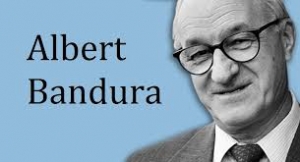
بندورا نخستین کتاب معروف خود را در سال 1963 با همکاری اولین دانشجوی دوره دکتری خود به نام ریچارد والترز تحت عنوان “یادگیری اجتماعی و رشد شخصیت” منتشر کرد. در این کتاب مفاهیم کلی و اصلی یادگیری اجتماعی بیان شد. او در سال 1973 به ریاست انجمن روانشناسان آمریکا انتخاب شد. طی سالهای اخیر گرایش بندورا به ابعاد شناختی شخصیت به مراتب افزایش یافته است. در حال حاضر وی فرایندهای پیچیده شناختی را با روشهای ظریف علمی و تجربی مورد بررسی قرار میدهد و برای بسیاری از روانشناسان معاصر یک الگوی عملی قابل قبول به شمار میرود.
از آلبرت بندورا در سال ۲۰۰۴ به خاطر یک عمر فعالیت درخشان در رشته روانشناسی تجلیل به عمل آمد و زمانی که بندورا در دانشگاه آیوا بود، تحت تاثیر عقاید کنت اسپنس نظریه پرداز یادگیری پیرو هال قرار گرفت و درباره روان درمانی کار آمد به بررسی وآزمایش پرداخت.
کارهای بندورا در میان نظریه پردازان یادگیری، روانشناسان اجتماعی و روانشناسان شناختی شهرت زیادی کسب کرده است. آزمایش های بندورا مبنی بر اینکه ما از راه مشاهده دیگران می آموزیم و اینکه این نوع یادگیری هم از راه تقلید و هم بدون آن رخ می دهد و نیز اینکه یادگیری مشاهده ای هم با تقویت صورت می پذیرد و هم بدون تقویت یک خدمت بزرگ به نظریه یادگیری بوده است.
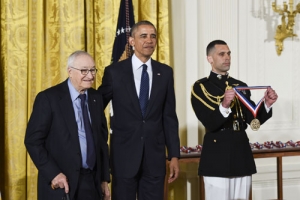

آلبرت بندورا ابتدا تمرکزش روی یادگیری بود. در آن زمان اغلب پژوهشهای یادگیری از طریق تجارب مستقیم صورت میگرفت؛ و فرض میشد که یادگیری فقط بهوسیله پاسخ دادن به محرکها و تجربه اثراتشان رخ میدهد. وی احساس کرد این خط سیر نظری با شواهد غیررسمی که نشان میدهند یادگیری از طریق مشاهده رفتار دیگران و پیامدهایشان رخ میدهد، بیگانه است. در حالی که رفتارگرایان بر تأثیر محیط بر رفتار تأکید میکردند، بندورا به تأثیر روی محیط علاقهمند شد. بندورا تعامل محیط-رفتار را، جبرگرایی متقابل نامید؛ محیط و رفتار و فرایندهای روانشناختی شخص پرداخت.
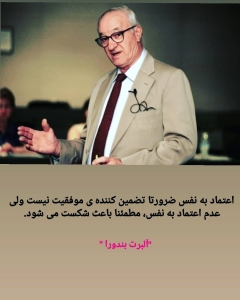
درباره نظریه:
آلبرت بندورا پیشگام نظریه یادگیری اجتماعی است. این نظریه بهخصوص در درک پرخاشگری و اینکه چطور طیف وسیعی از رفتارهای انسان توسط خودارزیابیها، برانگیخته و تنظیم میشود، مؤثر بوده است.
اولین بار او نقش تصویرسازی ذهنی را توصیف کرد. آلبرت بندورا یک رفتارگرای متعصب بود و یک روانشناس شناختی شد. بعلاوه آلبرت بندورا بیشتر اوقات پدر رفتارگرایی شناختی خوانده میشود. بلندپروازی نظری آلبرت بندورا سبب گردآوری «یک چارچوب نظری واحد برای تحلیل افکار و رفتار بشر شد».

وی از رفتارگرایی سنتی خارج شد بلکه به بررسی و تحقیق در زمینه یادگیری مشاهدهای، سرمشقگیری و خودتنظیمی پرداخت. این علاقه منجر شد وی در زمینه مکانیسمها و عوامل تعیینکننده یادگیری مشاهدهای سرمشقگیری رفتار قاعدهمند به پژوهش بپردازند.
او بین سه نوع الگو تمایز قائل شد: الگوی زنده (مثلاً، رفتار یک دوست)، الگوی نمادی (مثلاً، رفتار یک بازیگر در تلویزیون) و الگوی کلامی (مثلاً، رفتار شخصی که در داستان توصیف میشود.) پیشرفتهای چشمگیر در تکنولوژی ارتباطات در قرن گذشته (از رادیو تا تلویزیون و اینترنت) به این معنا است که محیط نمادی بهطور روزافزون نقش اساسی در شکلگیری ارزشها، عقیدهها، نگرشها و سبکهای زندگی دارد. همانگونه که کار بندورا بهطور اخص به تحولات معاصر در رشد تکنولوژی ارتباطات مربوط است.
آلبرت بندورا به نقش سرمشقگیری نمادین در گسترش اجتماعی شیوههای جدید رفتار، توجه ویژهای داشته که تقریباً همیشه با یک بررسی کلاسیک به نام مطالعه عروسک بوبو تداعی میشود. در این پژوهش، کودکان الگوهای بزرگسالی را دیدند که پرخاشگری میکردند، کودکان نیز رفتارهای پرخاشگری را نیز یاد گرفتند. بچههای بین 3 تا 6 سال، یک الگوی پرخاشگر (بزرگسالی که با چکش عروسکی را میزد) یک الگوی غیر پرخاشگر (بزرگسالی که با اسباببازیها بازی میکرد و توجهی به عروسک نداشت) و بدون الگو (گروهی که هیچ الگویی نداشتند) را تماشا کردند. بچههایی که الگوی پرخاشگر را دیده بودند، نسبت به دو گروه دیگر بیشتر تمایل داشتند از رفتار پرخاشگرانه تقلید کنند.
نظریه شناختی اجتماعی آلبرت بندورا، یکی از مؤثرترین توضیحات روانشناختی را در مورد افرادی ارائه میدهد که اعمال آسیبزای خود در مورد دیگران را کماهمیت و حتی توجیهپذیر میدانند. بندورا و همکارانش بسیاری از مکانیسمهای شناختی را تعریف کردهاند که متخلفان برای کوچک نشان دادن اعمالشان از آنها استفاده میکنند. این مکانیسمها شامل توجیه اخلاقی (مثل من دروغ گفتم تا از خانوادهام حمایت کنم)، برچسب حسن تعبیر و انکار پیامدها (من فقط از یک فروشگاه زنجیرهای بزرگ سرقت کردم) است.
علاقه دیگر آلبرت بندورا این بود که مشخص کند، مکانیسمهای تعیینکننده عوامل شخصی کدامند؟ این کار مرتبط بود با اینکه چطور افراد رفتار، انگیزه و محیطشان را تحت کنترل قرار میدهند. یک بعد این پژوهش این است که چطور رفتار انسان توسط معیارهای درونی و واکنشهای خودارزیابی پیشبینانه برانگیخته و تنظیم میشود. اگر فلان کار را انجام دهم، چطور احساس خواهم کرد. به عقیده بندورا، در بین مکانیسمهای عوامل شخصی کارآیی ادراک شده افراد برای کنترل جنبههای مختلف زندگیشان، اساسیتر و فراگیرتر است.
مطالعات آلبرت بندورا در مورد عوامل خانوادگی پرخاشگری، با اولین دانشجوی فوقلیسانس خود، ریچارد والتز (کسی که در تصادف موتورسیکلت فوت کرد) موجب شد تا بر نقش سرمشقگیری در تحول شخصیت بیشتر تأکید کند؛ مانند والترمیشل، نظریهپرداز شخصیت، آلبرت بندورا نظریه شناختی – اجتماعی را گسترش داد. بر طبق این نظریه شخص بهعنوان عامل فعال برای انعکاس تجربیات جهان، تصمیمگیری و طرح رفتار از فرایندهای شناختی مثل حافظه و حل مسئله، استفاده میکند. این نظریه با این دیدگاه که در آن شخص کمابیش پاسخدهنده نافعال به شرایط محیطی است یا قربانی کشانندههای ناهشیار است، مخالف است. در حقیقت، آلبرت بندورا شبیه آیزنگ به روانکاوی انتقاد میکند چون بر مفاهیمی متکی است که بهطور واضح نمیتوان آنها را تعریف کرد و همینطور نمیتوان آنها را تعریف کرد و همینطور نمیتوان اثربخشی روشهای درمانی منتج از آن را بررسی کرد. همچنین روانکاوی بر پیامدهای اجتنابناپذیر تجربیات اولیه دوران کودکی تأکید کرد. از این منظر میتوان بندورا را در زمره روانشناسی انسانگرایانه راجرز بهحساب آورد. برخلاف راجرز، رویکرد آلبرت بندورا بهجای خلق یک فضای درمانی که موجب تغییر و اصلاح شود بر اهمیت تجربیات واقعی در درمان و همینطور بر گسترش نظریهای که مبنای تجربی داشته باشد، تأکید دارد.
تأکید آلبرت بندورا روی مطالعه فرایندهای اکتساب، نگهداری و تغییر رفتار، متضاد کار نظریهپردازانی است که ارزش بیشتری به اثر تمایل فطری قائل میشوند. نظریه شناختی اجتماعی آلبرت بندورا ، انسان را ارگانیسمی توانا میبیند که خود را با محیط تطبیق میدهد و قادر به تغییر قسمتهایی از محیط برای سازگاری با آن میباشد. خود ساختاری ثابت نیست، بلکه مجموعهای از فرایندهای شناختی است. شخص یک ساختار روانشناختی که خود نامیده میشود ندارد، بلکه فرایندهای خود، بخشی از شخص است. آلبرت بندورا سیستم باوری خودکارآمدی را بنیاد انگیزش آدمی، بهزیستی و پیشرفت انسان میداند. شواهد تجربی خوبی برای حمایت از این گفته وی وجود دارد. باورهای کارآمد شخصی تمام جنبههای زندگی انسان را شکل میدهد. آیا آنها خوش بینند یا بدبین، آسیبپذیری آنها در برابر استرس و افسردگی و انتخابهایی که میکنند چقدر است.
هرچند انتقاد شده که نظریه خودکارآمدی آلبرت بندورا از این نکته غافل شده که این انتظارات پیامد است که معمولاً رفتار را هدایت میکند. اگر مردم باور کنند کاری را در موقعیت ویژهای انجام دهند، پس این انتظار دریافت پیامد مثبت است که اعمالشان را برمیانگیزد. وی بیان کرده مطالعات تجربی که به خوبی طراحیشده باشند، باید این نوع آشفتگیها را حل کنند و به شواهدی اشاره میکند که نشان میدهند باورهای خودکارآمدی تجربی میتوانند رفتار را بهتر از اندازهگیری انتظارات پیامد، پیشبینی کنند. این نظریه در بررسیهای بالینی تأثیرگذار بوده، برای مثال، تحلیل خودکفایی شخصی نشان میدهد که فوبیها مثل فوبیای ترس از مار ناشی از این است که افراد فوبیا در موقعیتهای ترسبرانگیز نسبت به خودکفایی خود تردید میکنند و برای کنار آمدن با منبع فوبیا، اطمینان کمی به توانایی خود دارند. برای اینکه این افراد بتوانند بر این موقعیتهای ترسآور فائق شوند، مداخلات درمانی بر توانایی انجام رفتارهای خاصی مثل دست زدن به مارها، استوار است. بندورا با موضع آیزنگ در این نکته موافق است که درمانها مؤثر هستند چون واکنشهای اضطرابی را کاهش میدهند اما با این نکته موافق نیست که مداخلات درمانی باید بر تضعیف درمانی هیجانی متمرکز شود. بلکه به جهان مداخلات درمانی بیشتر بر تقویت این باور که شخص میتواند بهطور مؤثر مقابله کند توجه کند.

نظریه یادگیری اجتماعی آلبرت بندورا ، بر جنبههای گوناگونی از زندگی انسان تأثیر گذاشته است. همانطور که اثر کلاسیک جان فارکوار «مطالعه سه جامعه» این سخن را تائید میکند. یک جامعه در مورد پیشگیری از بیماری قلب اطلاعات را توسط رسانههای گروهی و پست مستقیم دریافت میکند. عقاید بندورا در پنج دهه اخیر بسیار مورد توجه قرارگرفته است؛ زیرا آلبرت بندورا علاقهمند بود که نظریههای روانشناسی باید مبتنی بر دادههای تجربی باشد. این شور و اشتیاق را میتوان در کارهای او مشاهده کرد. تغییر نام نظریه یادگیری مشاهدهای (بیانگر موضع رفتارگرایی سنتی) به نظریه یادگیری اجتماعی (بیانگر تأکید بیشتر بر شیوههایی که رفتارهای اجتماعی با مشاهده رفتارهای دیگران آموخته میشود) و سپس به نظریه شناختی – اجتماعی (که به نقش فرایندهای شناختی در تعدیل یادگیری اجتماعی میپردازد) دلیلی بر این مدعا است.
کتاب شناسی:
- Benton, A. L., & Bandura, A. (1953). “Primary” and “secondary” suggestibility. Journal of Abnormal and Social Psychology, 43, 336-340. [The professor’s historic first article, published with his doctoral adviser at the University of Iowa, Art Benton].
- Bandura, A. (1954). The Rorschach white space response and “oppositional” behavior. Journal of Consulting Psychology, 18, 17-21.
- Bandura, A. (1954). The Rorschach white space response and perceptual reversal. Journal of Experimental Psychology, 48, 113-117.
- Bandura, A. (1956). Psychotherapists’ anxiety level, self-insight, and psychotherapeutic competence. Journal of Abnormal and Social Psychology, 52, 333-337.
- Bandura, A. (1957). Review of case studies in childhood emotional disabilities (Vol. 2) by G. Gardner. Contemporary Psychology, 2, 14-15.
- Bandura, A. (1958). Child-rearing patterns associated with adolescent aggressive disorders. In Physical and Behavioral Growth. Columbus, OH: Ross Laboratories.
- Bandura, A. (1961). Psychotherapy as a learning process. Psychological Bulletin, 58, 143-159.
- Bandura, A. (1962). Comments on Dr. Epstein’s paper. In M. R. Jones (Ed.), Nebraska Symposium on Motivation. Lincoln, NE: University of Nebraska Press.
- Bandura, A. (1962). Punishment revisited. Journal of Consulting Psychology, 26, 298-301.
- Bandura, A. (1962). Social learning through imitation. In M . R. Jones (Ed.), Nebraska Symposium on Motivation. Lincoln: University of Nebraska Press.
- Bandura, A. (1963). Behavior theory and indemnificatory learning. American Journal of Orthopsychiatry, 33, 591-601.
- Bandura, A. (1963). The role of imitation in personality, The Journal of Nursery Education, 18(3).
- Bandura, A. (1964). The stormy decade: Fact or fiction?Psychology in the Schools, 1, 224-231.
- Bandura, A. (1965). Behavioral modification through modeling procedures. In L. Krasner & L. P. Ullman (Eds.), Research in behavior modification. New York: Holt, Rinehart & Winston.
- Bandura, A. (1965). Influence of models’ reinforcement contingencies on the acquisition of imitative responses. Journal of Personality and Social Psychology, 1, 589-595.
- Bandura, A. (1965). Vicarious processes: A case of no-trial learning. In L. Berkowitz (Ed.), Advances in experimental social psychology (Vol. 2, pp. 1-55). New York: Academic Press.
- Bandura, A. (1966). Role of vicarious learning in personality development. Proceedings of the XVIIIth International Congress of Psychology: Social factors in the development of personality. Moscow, USSR.
- Bandura, A. (1967). Behavioral psychotherapy. Scientific American, 216, 78-86.
- Bandura, A. (1967). The role of modeling processes in personality development. In W. W. Hartup & N. L. Smothergill (Eds.), The young child. Washington, DC: National Association for the Education of Young Children.
- Bandura, A. (1968). A social learning interpretation of psychological dysfunctions. In P. London & D. L. Rosenhan (Eds.), Foundations of abnormal psychology. New York: Holt, Rinehart & Winston.
- Bandura, A. (1968). Imitation. In D. L. Sills (Ed.), International encyclopedia of the social sciences (Vol. 7). New York: Macmillan.
- Bandura, A. (1968). Modeling approaches to the modification of phobic disorders. In R. Porter (Ed.), The role of learning in psychotherapy: Ciba Foundation Symposium. London: Churchill.
- Bandura, A. (1968). On empirical disconfirmations of equivocal deductions with insufficient data. Journal of Consulting and Clinical Psychology, 32, 247-249.
- Bandura, A. (1968). Reinforcement therapy: An antidote for therapeutic pessimism. (Review of Reinforcement Therapy by O. I. Lovaas). Contemporary Psychology, 13, 36-39.
- Bandura, A. (1969). Principles of behavior modification. New York: Holt, Rinehart & Winston. [purchase at amazon.com]
- Bandura, A. (1969). Social learning of moral judgments. Journal of Personality and Social Psychology, 11, 275-279.
- Bandura, A. (1969). Social-learning theory of identificatory processes. In D. A. Goslin (Ed.), Handbook of socialization theory and research (pp. 213-262). Chicago: Rand McNally.
- Bandura, A. (1970). Modeling theory: Some traditions, trends, and disputes. In W. S. Sahakian (Ed.), Psychology of learning: Systems, models, and theories. Chicago: Markham.
- Bandura, A. (1971). Analysis of modeling processes. In A. Bandura (Ed.), Psychological modeling: Conflicting theories. Chicago: Aldine-Atherton.
- Bandura, A. (1971). Behavior therapy from a social learning perspective. Proceedings of the XIXth International Congress of Psychology. London, England.
- Bandura, A. (Ed.). (1971). Psychological modeling: Conflicting theories. New York: Aldine-Atherton. [purchase at amazon.com]
- Bandura, A. (1971). Psychotherapy based upon modeling principles. In A. E. Bergin & S. L. Garfield (Eds.), Handbook of psychotherapy and behavior change(pp. 653-708). New York: Wiley.
- Bandura, A. (1971). Social learning theory. New York: General Learning Press.
- Bandura, A. (1971). Vicarious and self-reinforcement processes. In R. Glaser (Ed.), The nature of reinforcement (pp. 228-278). New York: Academic Press. [Classic]
- Bandura, A. (1972). Socialization. Lexikon der Psychologie,Band III. Freiburg im Breisgau: Herder.
- Bandura, A. (1973). Aggression: A social learning analysis. Englewood Cliffs, NJ: Prentice-Hall . [read excerpt] [purchase at amazon.com]
- Bandura, A. (1973). Institutionally sanctioned violence. Journal of Clinical Child Psychology, 2, 23-24.
- Bandura, A. (1973). Social learning theory of aggression. In J. F. Knutson (Ed.), The control of aggression: Implications from basic research. Chicago: Aldine.
- Bandura, A. (1974). Behavior theory and the models of man. American Psychologist, 29, 859-869.
- Bandura, A. (1974). The case of the mistaken dependent variable. Journal of Abnormal Psychology, 83, 301-303.
- Bandura, A. (1974). The process and practice of participant modeling treatment. In J. H. Cullen [Ed.], Experimental behaviour: A basis for the study of mental disturbance. Dublin, Ireland: Irish University Press.
- Bandura, A. (1975). The ethics and social purposes of behavior modification. In C. M. Franks & G. T. Wilson (Eds.), Annual review of behavior therapy theory and practice(Vol. 3). New York: Brunner/Mazel.
- Bandura, A. (1976). Effecting change through participant modeling. In J. D. Krumboltz & C. E. Thoresen (Eds.), Counseling methods. New York: Holt, Rinehart & Winston.
- Bandura, A. (1976). New perspectives on violence. In V. C. Vaughan, III & T. B. Brazelton (Eds.), The family. Chicago: Year Book Medical Publishers.
- Bandura, A. (1976). Observational learning. Proceedings of the XXIst International Congress of Psychology, Paris, France. (Abstract)
- Bandura, A. (1976). Self-reinforcement: Theoretical and methodological considerations. Behaviorism, 4, 135-155. [Bandura’s classic exposition of the process of self-reinforcement]
- Bandura, A. (1976). Social learning analysis of aggression. In E. Ribes-Inesta & A. Bandura (Eds.), Analysis of delinquency and aggression. Hillsdale, NJ: Erlbaum.
- Bandura, A. (1976). Social learning perspective on behavior change. In A. Burton (Ed.), What makes behavior change possible?(pp. 34-57). New York: Brunner/Mazel.
- Bandura, A. (1977). Social learning theory. In B. B. Wolman & L. R. Pomroy (Eds.), International encyclopedia of psychiatry, psychology, psychoanalysis, and neurology(Vol. 10). New York: Van Nostrand Reinhold.
- Bandura, A. (1978). On distinguishing between logical and empirical verification. Scandinavian Journal of Psychology, 19, 97-99.
- Bandura, A. (1978). On paradigms and recycled ideologies. Cognitive Therapy and Research, 2, 79-103.
- Bandura, A. (1978). Perceived effectiveness: An explanatory mechanism of behavioral change. In G. Lindzey, C. S. Hall, & R. F. Thompson (Eds.), Psychology. New York: Worth.
- Bandura, A. (1978). Reflections on self-efficacy. In S. Rachman (Ed.), Advances in behavior research and therapy(Vol. 1., pp. 237-269). Oxford: Pergamon.
- Bandura, A. (1978). The self-system in reciprocal determinism, American Psychologist, 33, 344-358 . [Classic article in the history of psychology.]
- Bandura, A. (1978). Social learning theory of aggression. Journal of Communication, 28, 12-29.
- Bandura, A. (1979). On ecumenism in research perspectives. Cognitive Therapy and Research, 3, 245-248.
- Bandura, A. (1979). Psychological mechanisms of aggression. In M. VonCranach, K. Foppa, W. LePenies, & D. Ploog (Eds.), Human ethology: Claims and limits of a new discipline. Cambridge: Cambridge University Press.
- Bandura, A. (1979). Self-referent mechanisms in social learning theory. American Psychologist, 34, 439-441.
- Bandura, A. (1980). Gauging the relationship between self-efficacy judgment and action. Cognitive Therapy and Research, 4, 263-268.
- Bandura, A. (1981). In search of pure unidirectional determinants. Behavior Therapy, 12, 30-40.
- Bandura, A. (1981). Self-referent thought: A developmental analysis of self-efficacy. In J. H. Flavell & L. Ross (Eds.), Social cognitive development: Frontiers and possible futures(pp. 200-239). Cambridge: Cambridge University Press.
- Bandura, A. (1982). The assessment and predictive generality of self-percepts of efficacy. Journal of Behavior Therapy and Experimental Psychiatry, 13, 195-199.
- Bandura, A. (1982). Psychology of chance encounters and life paths, American Psychologist, 37, 747-755. [Classic article in the history of psychology.]
- Bandura, A. (1982). The self and mechanisms of agency. In J. Suls (Ed.), Psychological perspectives on the self(Vol. 1, pp. 3-39). Hillsdale, NJ: Erlbaum.
- Bandura, A. (1983). Psychological mechanisms of aggression. In R. G. Geen & E. Donnerstein (Eds.), Aggression: Theoretical and empirical reviews(pp. 1-40). New York: Academic Press.
- Bandura, A. (1983). Self-efficacy determinants of anticipated fears and calamities. Journal of Personality and Social Psychology, 45, 464-469.
- Bandura, A. (1983). Temporal dynamics and decomposition of reciprocal determinism: A reply to Phillips and Orton. Psychological Review, 90, 166-170.
- Bandura, A. (1984). Recycling misconceptions of perceived self-efficacy. Cognitive Therapy and Research, 8, 231-255.
- Bandura, A. (1984). Representing personal determinants in causal structures. Psychological Review, 91, 508-511.
- Bandura, A. (1985). Explorations in self-efficacy. In S. Sukemune (Ed.), Advances in social learning theory. Tokyo: Kaneko-shoho.
- Bandura, A. (1985). Model of causality in social learning theory. In S. Sukemune (Ed.), Advances in social learning theory. Tokyo: Kaneko-Shoho. [Reprinted in Bandura, A. (1985). Model of causality in social learning theory. In M. J. Mahoney & A. Freeman (Eds.), Cognition and psychotherapy(pp. 81-99). Plenum Publishing Corporation.]
- Bandura, A. (1985). Observational learning. In S. Sukemune (Ed.), Advances in social learning theory. Tokyo: Kaneko-shoho.
- Bandura, A. (1985). Reciprocal determinism. In S. Sukemune (Ed.), Advances in social learning theory. Tokyo: Kaneko-shoho.
- Bandura, A. (1986). Fearful expectations and avoidant actions as coeffects of perceived self-inefficacy. American Psychologist, 41, 1389-1391.
- Bandura, A. (1986). From thought to action: Mechanisms of personal agency. New Zealand Journal of Psychology, 15, 1-17.
- Bandura, A. (1986). The explanatory and predictive scope of self-efficacy theory. Journal of Clinical and Social Psychology, 4, 359-373.
- Bandura, A. (1986).The social learning perspective: Mechanisms of aggression. In H. Toch (Ed.), Psychology of crime and criminal justice(pp. 198-236). Prospect Heights, IL: Waveland Press.
- Bandura, A. (1988). Organizational applications of social cognitive theory. Australian Journal of Management, 13, 275-302.
- Bandura, A. (1988). Perceived self-efficacy: Exercise of control through self-belief. In J. P. Dauwalder, M. Perrez, & V. Hobi (Eds.), Annual series of European research in behavior therapy(Vol. 2, pp. z27-59). Amsterdam/Lisse, Netherlands: Swets & Zeitlinger.
- Bandura, A. (1988). Self-efficacy conception of anxiety. Anxiety Research, 1, 77-98.
- Bandura, A. (1988). Self-regulation of motivation and action through goal systems. In V. Hamilton, G. H. Bower, & N. H. Frijda (Eds.), Cognitive perspectives on emotion and motivation(pp. 37-61). Dordrecht: Kluwer Academic Publishers.
- Bandura, A. (1989). A social cognitive theory of action. In J. P. Forgas & M. J. Innes (Eds.), Recent advances in social psychology: An international perspective(pp. 127-138). North Holland: Elsevier.
- Bandura, A. (1989). Human agency in social cognitive theory. American Psychologist, 44, 1175-1184. [This is a classic in the history of psychology.]
- Bandura, A. (1989). Perceived self-efficacy in the exercise of control over AIDS infection. In V. M. Mays, G. W . Albee, & S. F. Schneider (Eds.), The primary prevention of AIDS: Psychological approaches (pp. 128-141). Newbury Park, CA: Sage.
- Bandura, A. (1989). Perceived self-efficacy in the exercise of personal agency. The Psychologist: Bulletin of the British Psychological Society, 2, 411-424.
- Bandura, A. (1989). Regulation of cognitive processes through perceived self-efficacy . Developmental Psychology, 25, 725-739 (html).
- Bandura, A. (1989). Self-regulation of motivation and action through internal standards and goal systems. In L. A. Pervin (Ed.), Goals concepts in personality and social psychology (pp. 19-85). Hillsdale, NJ: Erlbaum.
- Bandura, A. (1989). Social cognitive theory. In E. Barnouw (Ed.), International encyclopedia of communications (Vol. 4, pp. 92-96). New York: Oxford University Press.
- Bandura, A. (1989). Social cognitive theory. In R. Vasta (Ed.), Annals of child development. Vol. 6. Six theories of child development(pp. 1-60). Greenwich, CT: JAI Press.
- Bandura, A. (1989). Social cognitive theory of mass communication. In J. Groebel & P. Winterhoff-Spurk (Eds.), Empirische Medienpsychologie (pp. 7-32). Munich, Germany: Psychologie Verlags Union.
- Bandura, A. (1990). Mechanisms of moral disengagement. In W. Reich (Ed.), Origins of terrorism: Psychologies, ideologies, theologies, states of mind(pp. 161-191). Cambridge: Cambridge University Press.
- Bandura, A. (1990). Multidimensional scales of perceived academic efficacy. Stanford University, Stanford, CA. [these scales have subsequently been published in Bandura, A. (2006). Guide for constructing self-efficacy scales. In F. Pajares & T. Urdan (Eds.). Self-efficacy beliefs of adolescents, (Vol. 5., pp. 307-337). Greenwich, CT: Information Age Publishing.]
- Bandura, A. (1990). Perceived self-efficacy in the exercise of control over AIDS infection. Evaluation & Program Planning, 13, 9-17.
- Bandura, A. (1990). Perceived self-efficacy in the exercise of personal agency. Journal of Applied Sport Psychology, 2, 128-163. [Reprint of Bandura, A. (1989). Perceived self-efficacy in the exercise of personal agency. The Psychologist: Bulletin of the British Psychological Society, 2, 411-424.]
- Bandura, A. (1990). Reflections on nonability determinants of competence. In R. J. Sternberg & J. Kolligian, Jr. (Eds.), Competence considered(pp. 315-362). New Haven, CT: Yale University Press, 1990.
- Bandura, A. (1990). Selective activation and disengagement of moral control. Journal of Social Issues, 46, 27-46.
- Bandura, A. (1990). Some reflections on reflections. Psychological Inquiry, 1, 101-105. [In this brief commentary, Prof. Bandura responds to various reviews of his book, Social Foundations of Thought and Action.]
- Bandura, A. (1991). Human agency: The rhetoric and the reality. American Psychologist, 46, 157-162 (html).
- Bandura, A. (1991). Self-efficacy conception of anxiety. In R. Schwarzer & R. A. Wicklund (Eds.), Anxiety and self-focused attention. (pp. 89-110). New York: Harwood Academic Publishers.
- Bandura, A. (1991). Self-efficacy mechanism in physiological activation and health-promoting behavior. In J. Madden, IV (Ed.), Neurobiology of learning, emotion and affect(pp. 229-270). New York: Raven, 1991.
- Bandura, A. (1991). Self-efficacy, impact of self-beliefs on adolescent life paths. In R. M. Lerner, A. C. Peterson, & J. Brooks-Gunn (Eds.), Encyclopedia of adolescence(Vol. 2, pp. 995-1000). New York: Garland.
- Bandura, A. (1991). Self-regulation of motivation through anticipatory and self-regulatory mechanisms. In R. A. Dienstbier (Ed.), Perspectives on motivation: Nebraska symposium on motivation(Vol. 38, pp. 69-164). Lincoln: University of Nebraska Press. [Large download, 5 MB]
- Bandura, A. (1991). Social cognitive theory of moral thought and action. In W. M. Kurtines & J. L. Gewirtz (Eds.), Handbook of moral behavior and development (Vol. 1, pp. 45-103). Hillsdale, NJ: Lawrence Erlbaum..
- Bandura, A. (1991). Social cognitive theory of self-regulation. Organizational Behavior and Human Decision Processes, 50, 248-287.
- Bandura, A. (1991). The changing icons in personality psychology. In J. H. Cantor (Ed.), Psychology at Iowa: Centennial essays (pp. 117-139). Hillsdale, NJ: Erlbaum.
- Bandura, A. (1992). A social cognitive approach to the exercise of control over AIDS infection. In R. DiClemente (Ed.), Adolescents and AIDS: A generation in jeopardy(pp. 89-116). Beverly Hills: Sage.
- Bandura, A. (1992). Exercise of personal agency through the self-efficacy mechanism. In R. Schwarzer (Ed.), Self-efficacy: Thought control of action(pp. 3-38). Washington, D.C.: Hemisphere.
- Bandura, A. (1992). Observational learning. In L. R. Squire (Ed.), Encyclopedia of learning and memory. New York: Macmillan.
- Bandura, A. (1992). On rectifying the comparative anatomy of perceived control. Applied and Preventive Psychology: Current Scientific Perspectives, 1, 121-126.
- Bandura, A. (1992). Psychological aspects of prognostic judgments. In R. W. Evans, D. S. Baskin, & F. M. Yatsu (Eds.), Prognosis of neurological disorders(pp. 13-28). New York: Oxford University Press.
- Bandura, A. (1992). Self-efficacy mechanism in psychobiologic functioning. In R. Schwarzer (Ed.), Self-efficacy: Thought control of action(pp. 355-394). Washington, D.C.: Hemisphere.
- Bandura, A. (1992). Social cognitive theory and social referencing. In S. Feinman (Ed.), Social referencing and the social construction of reality in infancy(pp. 175-208). New York: Plenum Press.
- Bandura, A. (1992). Social cognitive theory. In R. Vasta (Ed.), Six theories of child development: Revised formulations and current issues (pp. 1-60). London: Jessica Kingsley Publishers.
- Bandura, A. (1993). Perceived self-efficacy in cognitive development and functioning. Educational Psychologist, 28, 117-148.
- Bandura, A. (1994). Regulative function of perceived self-efficacy. In M. G. Rumsey, C. B. Walker, & J. H. Harris (Eds.), Personal selection and classification (pp. 261-271). Hillsdale, NJ: Erlbaum.
- Bandura, A. (1994). Self-efficacy. In R. J. Corsini (Ed.), Encyclopedia of psychology(2nd ed., Vol. 3, pp. 368-369). New York: Wiley.
- Bandura, A. (1994). Self-efficacy. In V. S. Ramachaudran (Ed.), Encyclopedia of human behavior(Vol. 4, pp. 71-81). New York: Academic Press. (Reprinted in H. Friedman [Ed.], Encyclopedia of mental health. San Diego: Academic Press, 1998).
- Bandura, A. (1994). Social cognitive theory and exercise of control over HIV infection. In R. J. DiClemente & J. L. Peterson (Eds.), Preventing AIDS: Theories and methods of behavioral interventions(pp. 25-59). New York: Plenum. [This is a revised and updated chapter of the 1992 chapter]
- Bandura, A. (1994). Social cognitive theory of mass communication. In J. Bryant & D. Zillman (Eds.), Media effects: Advances in theory and research(pp. 61-90). Hillsdale, NJ: Erlbaum.
- Bandura, A. (1995). Comments on the crusade against the causal efficacy of human thought, Journal of Behavior Therapy and Experimental Psychiatry, 26,179-190.
- Bandura, A. (1995). Exercise of personal and collective efficacy in changing societies. In A. Bandura (Ed.), Self-efficacy in changing societies (pp. 1-45). New York: Cambridge University Press.
- Bandura, A. (1995). Modeling. In A. S. R. Manstead & M. Hewstone (Eds.), Blackwell encyclopedia of social psychology (p. 409). Oxford: Blackwell.
- Bandura, A. (1995). On rectifying conceptual ecumenism. In J. E. Maddux (Ed.), Self-efficacy, adaptation, and adjustment: Theory, research and application(pp. 347-375). New York: Plenum.
- Bandura, A. (1995). Self-efficacy. In A. S. R. Manstead & M. Hewstone (Eds.), Blackwell encyclopedia of social psychology(pp. 453-454). Oxford: Blackwell.
- Bandura, A. (Ed.). (1995). Self-efficacy in changing societies. New York: Cambridge University Press. [purchase at amazon.com]
- Bandura, A. (1995). Social learning. In A. S. R. Manstead & M. Hewstone (Eds.), Blackwell encyclopedia of social psychology(pp. 600-606). Oxford: Blackwell.
- Bandura, A. (1996). Failures in self-regulation: Energy depletion or selective disengagement?Psychological Inquiry, 7, 20-24.
- Bandura, A. (1996). Ontological and epistemological terrains revisited, Journal of Behavior Therapy and Experimental Psychiatry, 27,323-345. A must read!!
- Bandura, A. (1996). Reflections on human agency. In J. Georgas & M. Manthouli (Eds.), Contemporary psychology in Europe: Theory, research and applications(pp. 194-210). Seattle, WA: Hogrefe & Huber.
- Bandura, A. (1996). Regulation of cognitive processes through perceived self-efficacy. In G. H. Jennings & D. Belanger (Eds.), Passages beyond the gate: A Jungian approach to understanding the nature of American psychology at the dawn of the new millennium(pp. 96-107). Needham Heights, MA: Simon & Schuster. [Reprint of Bandura, A. (1989). Regulation of cognitive processes through perceived self-efficacy . Developmental Psychology, 25, 725-739 (html).]
- Bandura, A. (1996). Social cognitive theory of human development. In T. Husen & T. N. Postlethwaite (Eds.), International encyclopedia of education(2nd ed., pp. 5513-5518) Oxford: Pergamon Press.
- Bandura, A. (1997). Personal efficacy in psychobiologic functioning. In G. V. Caprara (Ed.), Bandura: A leader in psychology(pp. 43-66). Milan, Italy: Franco Angeli.
- Bandura, A. (1997). Reflections on moral disengagement. In G. V. Caprara (Ed.), Bandura: A leader in psychology (pp. 23-41). Milano, Italy: Franco Angeli.
- Bandura, A. (1997). Self-efficacy and health behaviour. In A. Baum, S. Newman, J. Wienman, R. West, & C. McManus (Eds.), Cambridge handbook of psychology, health and medicine(pp. 160-162). Cambridge: Cambridge University Press.
- Bandura, A. (1997). The anatomy of stages of change. American Journal of Health Promotion, 12, 8-10.
- Bandura, A. (1998, August). Exercise of agency in accenting the positive. Invited address delivered at the meeting of the American Psychological Association, San Francisco.
- Bandura, A. (1998). Exploration of fortuitous determinants of life paths, Psychological Inquiry, 9,95-99.
- Bandura, A. (1998). Health promotion from the perspective of social cognitive theory. Psychology and Health, 13, 623-649.
- Bandura, A. (1998). Personal and collective efficacy in human adaptation and change. In J. G. Adair, D. Belanger, & K. L. Dion (Eds.), Advances in psychological science: Vol. 1. Personal, social and cultural aspects(pp. 51-71). Hove, UK: Psychology Press.
- Bandura, A. (1999. Exercise of agency in personal and social change. In E. Sanavio (Ed.), Behavior and cognitive therapy today: Essays in honor of Hans J. Eysenck. (pp. 1-29). Oxford: Anonima Romana.
- Bandura, A. (1999). Moral disengagement. In I. W. Charny (Ed.), Encyclopedia of genocide(pp. 415-418). Santa Barbara, CA: ABC-Clio.
- Bandura, A. (1999). Moral disengagement in the perpetration of inhumanities. Personality and Social Psychology Review. [Special Issue on Evil and Violence], 3, 193-209. This article is the fifth most cited article in PSPR.
- Bandura, A. (1999). Psychological aspects of prognostic judgments. In R. W. Evans, D. S. Baskin, & F. M. Yatsu (Eds.), Prognosis of neurological disorders(2nd ed.). New York: Oxford University Press.
- Bandura, A. (1999). Self-efficacy: Toward a unifying theory of behavioral change. In R. F. Baumeister (Ed.), The self in social psychology. Key readings in social psychology(pp. 285-298). Philadelphia: Psychology Press/Taylor & Francis.
- Bandura, A. (1999). Social cognitive theory: An agentic perspective. Asian Journal of Social Psychology, 2, 21-41.
- Bandura, A. (1999). A social cognitive theory of personality. In L. Pervin & John, O. P. (Ed.), Handbook of personality: Theory and research(2nd ed., pp. 154-196). New York: Guilford Publications.
- Bandura, A., Grusec, J. E., & Menlove, F. L. (1966). Observational learning as a function of symbolization and incentive set. Child Development, 37, 499-506.
- Bandura, A., Grusec, J. E., & Menlove, F. L. (1967). Some social determinants of self-monitoring reinforcement systems. Journal of Personality and Social Psychology, 5, 449-455.
- Bandura, A., Grusec, J. E., & Menlove, F. L. (1967). Vicarious extinction of avoidance behavior. Journal of Personality and Social Psychology, 5, 16-23.
- Bandura, A., & Harris, M . B. (1966). Modification of syntactic style. Journal of Experimental Child Psychology, 4, 341-352.
- Bandura, A., & Huston, A. C. (1961). Identification as a process of incidental learning. Journal of Abnormal and Social Psychology, 63, 311-318.
- Bandura, A., & Jeffery, R. W. (1973). Role of symbolic coding and rehearsal processes in observational learning. Journal of Personality and Social Psychology, 26, 122-130.
- Bandura, A., Jeffery, R. W., & Bachicha, D. L. (1974). Analysis of memory codes and cumulative rehearsal in observational learning. Journal of Research in Personality, 7, 295-305.
- Bandura, A., Jeffery, R. W., & Gajdos, E. (1975). Generalizing change through participant modeling with self-directed mastery. Behaviour Research and Therapy, 13, 141-152.
- Bandura, A., Jeffery, R. W., & Wright, C. L. (1974). Efficacy of participant modeling as a function of response induction aids. Journal of Abnormal Psychology, 83, 56-64.
- Bandura, A., & Jourden, F. J. (1991). Self-regulatory mechanisms governing the impact of social comparison on complex decision making. Journal of Personality and Social Psychology, 60, 941-951.
- Bandura, A., & Kupers, C. J. (1964). Transmission of patterns of self-reinforcement through modeling. Journal of Abnormal and Social Psychology, 69, 1-9.
- Bandura, A., Lipsher, D. H., & Miller, P. E. (1960). Psychotherapists’ approach- avoidance reactions to patients’ expression of hostility. Journal of Consulting Psychology, 24, 1-8.
- Bandura, A., & Locke, E. (2003). Negative self-efficacy and goal effects revisited. Journal of Applied Psychology, 88, 87-99.
- Bandura, A., & Mahoney, M. J. (1974). Maintenance and transfer of self-reinforcement functions. Behaviour Research and Therapy, 12, 89-97.
- Bandura, A., Mahoney, M. J., & Dirks, S. J. (1976). Discriminative activation and maintenance of contingent self-reinforcement. Behaviour Research and Therapy, 14, 1-6.
- Bandura, A., Mahoney, M. J., Dirks, S. J., & Wright, C. L. (1974). Relative preference for external and self-controlled reinforcement in monkeys. Behaviour Research and Therapy, 12, 157-163.
- Bandura, A., & McDonald, F. J. (1963). The influence of social reinforcement and the behavior of models in shaping children’s moral judgments. Journal of Abnormal and Social Psychology, 67, 274-281.
- Bandura, A., & McDonald, F. J. (1994). Influence of social reinforcement and the behavior of models in shaping children’s moral judgments. In B. Puka (Ed.), Defining perspectives in moral development. Moral development: A compendium, Vol. 1(pp. 136-143). New York: Garland Publishing, Inc. [Reprint of article listed above]
- Bandura, A., & Menlove, F. L. (1968). Factors determining vicarious extinction of avoidance behavior through symbolic modeling. Journal of Personality and Social Psychology, 8, 99-108.
- Bandura, A., & Mischel, W. (1965). Modification of self-imposed delay of reward through exposure to live and symbolic models. Journal of Personality and Social Psychology, 2, 698-705. [A pioneering study of the social origins of children’s self-motivation and self-regulation]
- Bandura, A., O’Leary, A., Taylor, C. B., Gauthier, J., & Gossard, D. (1987). Perceived self-efficacy and pain control: Opiod and nonopioid mechanisms. Journal of Personality and Social Psychology, 53, 563-571.
- Bandura, A., Pastorelli, C., Barbaranelli, C., & Caprara, G. V. (1999). Self-efficacy pathways to childhood depression. Journal of Personality and social Psychology, 76, 258-269.
- Bandura, A., & Perloff, B. (1967). Relative efficacy of self-monitored and externally imposed reinforcement systems. Journal of Personality and Social Psychology, 7, 111-116.
- Bandura, A., Polydoro, R., Azzi, R. (Eds.) (2008). Social cognitive theory: Basic concepts. Porta Allegre, Brasil: ARTMED Editora S/A.
- Bandura, A., & Ribes-Inesta, E. (Eds.) (1976). Analysis of delinquency and aggression. Hillsdale, NJ: Erlbaum. [purchase at amazon.com]
- Bandura, A., Reese, L., & Adams, N. E. (1982). Microanalysis of action and fear arousal as a function of differential levels of perceived self-efficacy. Journal of Personality and Social Psychology, 43, 5-21.
- Bandura, A., & Rosenthal, T. L. (1966). Vicarious classical conditioning as a function of arousal level. Journal of Personality and Social Psychology, 3, 54-62.
- Bandura, A., Ross, D., & Ross, S. A. (1961). Transmission of aggression through imitation of aggressive models. Journal of Abnormal and Social Psychology, 63, 575-582. [This is a classic article in the history of psychology. In it, Bandura introduces the Bobo Doll experiments.]
- Bandura, A., Ross, D., & Ross, S. A. (1963). A comparative test of the status envy, social power, and secondary reinforcement theories of identificatory learning. Journal of Abnormal and Social Psychology, 67, 527-534.
- Bandura, A., Ross, D., & Ross, S. A. (1963). Imitation of film-mediated aggressive models. Journal of Abnormal and Social Psychology, 66, 3-11. [This is a classic article in the history of psychology.
- Bandura, A., Ross, D., & Ross, S. A. (1963). Vicarious reinforcement and imitative learning. Journal of Abnormal and Social Psychology, 67, 601-607.
- Bandura, A., & Schunk, D. H. (1981). Cultivating competence, self-efficacy and intrinsic interest through proximal self-motivation. Journal of Personality and Social Psychology, 41, 586-598.
- Bandura, A., & Simon, K. M. (1977). The role of proximal intentions in self-regulation of refractory behavior. Cognitive Therapy and Research, 1, 177-193.
- Bandura, A., Taylor, C. B., Williams, S. L, Mefford, I. N., & Barchas, J. D. (1985). Catecholamine secretion as a function of perceived coping self-efficacy. Journal of Consulting and Clinical Psychology, 53, 406-414.
- Bandura, A., Underwood, B., & Fromson, M. E. (1975). Disinhibition of aggression through diffusion of responsibility and dehumanization of victims, Journal of Research in Personality, 9, 253-269 .
- Bandura, A., & Walters, R. H. (1958). Dependency conflicts in aggressive delinquents. Journal of Social Issues, 14, 52-65.
- Bandura, A., & Walters, R. H. (1959). Adolescent aggression. New York: Ronald Press.
[purchase at amazon.com] - Bandura, A., & Walters, R. H. (1963). Aggression. In Child psychology: The sixty-second yearbook of the national society for the study of education, Part I. Chicago: The National Society for the Study of Education.
- Bandura, A., & Walters, R. H. (1963). Social learning and personality development. New York: Holt, Rinehart & Winston.
[purchase at amazon.com] - Bandura, A., & Whalen, C. K. (1966). The influence of antecedent reinforcement and divergent modeling cues on patterns of self-reward. Journal of Personality and Social Psychology, 3, 373-382.
- Bandura, A., & Winder, C. L., Ahmad, F. Z., & Rau, L. C. (1962). Dependency of patients, psychotherapists’ responses, and aspects of psychotherapy. Journal of Consulting Psychology, 26, 129-134.
- Bandura, A., & Wood, R. E. (1989). Effect of perceived controllability and performance standards on self-regulation of complex decision-making. Journal of Personality and Social Psychology, 56, 805-814.
- Benight, C. C., & Bandura, A. (2004). Social cognitive theory of posttraumatic recovery: The role of perceived self-efficacy. Behaviour Research and Therapy, 42, 1129-1148.
- Bussey, K., & Bandura, A. (1984). Influence of gender constancy and social power on sex-linked modeling. Journal of Personality and Social Psychology, 47, 1292-1302.
- Bussey, K., & Bandura, A. (1992). Self-regulatory mechanisms governing gender development. Child Development, 63, 1236-1250.
- Bussey, K., & Bandura, A. (1999). Social cognitive theory of gender development and differentiation, Psychological Review, 106,676-713.
- Bussey, K., & Bandura, A. (2004). Social cognitive theory of gender development and functioning. In A.H. Eagly, A. Beall, & R. Sternberg (Eds.). The psychology of gender(2nd ed., pp.92-119) New York: Guilford.
- Caprara, G. V., Barbaranelli, C., Caprara, M., Gerbino, M., Pastorelli C., Regalia, C., & Bandura, A. (1998). Social cognitive determinants of psychological and social development: Beliefs of personal efficacy. Adolescenza, 9, 182-207.
- Caprara, G. V., Barbaranelli, C., Pastorelli, C., Bandura, A., & Zimbardo, P. G. (2000). Prosocial foundations of children’s academic achievement. Psychological Science, 11, 302-306.
- Caprara, G. V., Camillo, R., & Bandura, A., (2002). Longitudinal impact of perceived self-regulatory efficacy on violent conduct. American Psychological Association, 7, 63-69.
- Caprara, G. V., Fida, R., Vecchione, M., Del Bove, G., Vecchio, G. M., Barbaranelli, C., & Bandura, A. (2008). Longitudinal analysis of the role of perceived efficacy for self-regulated learning in academic continuance and achievement. Journalof Educational Psychology, 100, 525-534.
- Caprara, G. V., Pastorelli C., & Bandura, A. (1995). La misura del disimpegno morale in et` evolutiva [The measurement of moral disengagement in children]. Eta Evolutiva, 18-29.
- Caprara, G.V., Regalia, C., & Bandura, A. (2002). Longitudinal impact of perceived self-regulatory efficacy on violent conduct. European Psychologist, 7, 63-69.
- Caprara, G. V., Regalia, C., Scabini, E., & Bandura, A. (2005). Impact of adolescents’ filial self-efficacy on quality of family functioning and satisfaction.Journal of Research on Adolescence, 15, 71-97.
- Caprara, G. V., Regalia, C., Scabini, E., Barbaranelli, C., & Bandura, A. (2004). Assessment of filial, parental, marital, and collective family efficacy beliefs. European Journal of Psychological Assessment, 20, 247-261.
- Caprara, G. V., Scabini, E., Barbaranelli, C., Pastorelli, C., & Bandura, A. (2000). Autoefficacia percepita emotiva e interpersonale e buon funzionamento sociale [Emotional and interpersonal perceived self-efficacy and social well-being]. Giornale Italiano di Psicologia, 26, 769-789.
- Caprara, G. V., Scabini, E., Barbaranelli, C., Pastorelli, C., Regalia, C., & Bandura, A. (1998). Impact of adolescents’ perceived self-regulatory efficacy on familial communication and antisocial conduct. European Psychologist, 3, 125-132.
- Caprara, G. V., Scabini, E., Barbaranelli, C., Pastorelli, C., Regalia, C., & Bandura, A. (1999). Perceived emotional and interpersonal self-efficacy and good social functioning. Giornale Italiano di Psicologia, 26, 769-789.
- Carroll, W. R., & Bandura, A. (1982). The role of visual monitoring in observational learning of action patterns: Making the unobservable observable. Journal of Motor Behavior, 14, 153-167.
- Carroll, W. R., & Bandura, A. (1985). Role of timing of visual monitoring and motor rehearsal in observational learning of action patterns. Journal of Motor Behavior, 17, 269-281.
- Carroll, W. R., & Bandura, A. (1987). Cognitive determinants of observational learning: A casual analysis. Bulletin of the Psychonomic Society, 25, 352. [brief abstract for papers presented at the annual meetings of the Psychonomic Society]
- Carroll, W. R., & Bandura, A. (1987). Translating cognition into action: The role of visual guidance in observational learning. Journal of Motor Behavior, 19, 385-398.
- Carroll, W. R., & Bandura, A. (1988). Effect of factors and motor rehearsal on observational learning. Bulletin of the Psychonomic Society, 26, 492. [brief abstract for papers presented at the annual meetings of the Psychonomic Society]
- Carroll, W. R., & Bandura, A. (1990). Representational guidance of action production in observational learning: A causal analysis. Journal of Motor Behavior, 2, 85-97.
- Clark, M., Ghandour, G., Miller, N. H., Taylor, C. B., Bandura, A., DeBusk, R. F. (1997). Development and evaluation of a computer-based system for dietary management of hyperlipidemia. Journal of the American Dietary Association, 97, 146-150.
- Debowski, S., Wood, R., & Bandura, A. (2001). Impact of guided exploration and enactive exploration on self-regulatory mechanisms and information acquisition through electronic search. Journal of Applied Psychology, 86, 1129-1141.
- DeBusk, R. F., Miller, N. H., Parker, K. M., Bandura, A., Kraemer, H. C., Cher, D. J., et al. (2004). Care management for low-risk patients with heart failure: A randomized, controlled trial.Annals of Internal Medicine, 141, 606-613.
- DeBusk, R. F., Miller, N. H., Superko, H. R., Dennis, C. A., Thomas, R. J., Lew, H. T., Berger III, W. E., Heller, R. S., Rompf, J., Gee, D., Kraemer, H. C., Bandura, A., Ghandour, G., Clark, M., Shah, R. V., Fisher, L., & Taylor, C. B. (1994). A case-management system for coronary risk factor modification after acute myocardial infarction. Annals of Internal Medicine, 120, 721-729.
- Epel, E. S., Bandura, A., & Zimbardo, P. G. (1999). Escaping homelessness: The influences of self-efficacy and time perspective on coping with homelessness. Journal of Applied Social Psychology, 29, 575-596.
- Fernández-Ballesteros, R., Díez-Nicolás, J., Caprara, G. V., Barbaranelli, C., & Bandura, A. (2002). Determinants and structural relation of personal efficacy to collective efficacy. Applied Psychology: An International Review, 51, 107-125.
- Jourden, F. J., Bandura, A., & Banfield, J. T. (1991). The impact of conceptions of ability on self-regulatory factors and motor skill acquisition. Journal of Sport and Exercise Psychology, 8, 213-226.
- Lorig, K. R., Ritter, P., Stewart, A. L., Sobel, D. S., Brown, Jr., B. W., Bandura, A., Gonzales, V. M ., Laurent, D. D., & Holman, H. R. (2001). Chronic disease self-management programs: 2-year health status and health care utilization outcomes. Medical Care, 39, 1217-1223.
- Lorig, K. R., Sobel, D. S., Stewart, A. L., Brown, Jr. B. W., Bandura, A., Ritter, P., Gonzalez, V. M., Laurent, D. D., & Holman, H. R. (1999). Evidence suggesting that a chronic disease self-management program can improve health status while reducing hospitalization: A randomized trial. Medical Care, 37,5-14.
- Mahoney, M. J., & Bandura, A. (1972). Self-reinforcement in pigeons. Learning and Motivation, 3, 93-303.
- Mahoney, M. J., Bandura, A., Dirks, S. J., & Wright, C. L. (1974). Relative preference for external and self-controlled reinforcement in monkeys. Behaviour Research and Therapy, 12, 157-163.
- McAlister, A. J., Bandura, A., & Owen, S. V. (2006). Mechanisms of moral disengagement in support of military force: The impact of September 11. Journal of Social and Clinical Psychology.
- Osofsky, M. J., Bandura, A., & Zimbardo, P. G. (2005). The role of moral disengagement in the execution process. Law and Human Behavior, 29, 371-393.
- Ozer, E. M., & Bandura, A. (1990). Mechanisms governing empowerment effects: A self-efficacy analysis. Journal of Personality and Social Psychology, 58, 472-486.
- Pastorelli, C., Caprara, G. V., & Bandura, A. (1998). The measurement of self-efficacy in school-age children: A preliminary contribution. [Italian]. Eta evolutiva, 61, 28-40. [preliminary piece on assessment of self-efficacy]
- Pastorelli, C., Caprara, G. V., Barbaranelli, C., Rola, J., Rozsa, S., & Bandura, A. (2001). Structure of children’s perceived self-efficacy: A crossnational study. European Journal of Psychological Assessment, 17, 87-97.
- Rosenthal, T. L., & Bandura, A. (1978). Psychological modeling: Theory and practice. In S. L. Garfield & A. E. Bergin (Eds.), Handbook of psychotherapy and behavior change: An empirical analysis(2nd ed., pp. 621-658). New York: Wiley.
- Rudd, P., Miller, N. H., Kaufman, J., Kraemer, H. C., Bandura, A., Greenwald, G., et al. (2004). Nurse management for hypertension: A systems approach. American Journal of Hypertension, 17, 921-927.
- Steffen, A. M., McKibbin, C., Zeiss, A. M., Gallagher-Thompson, D., & Bandura, A. (2002). The Revised Scale for Caregiving Self-Efficacy: Reliability and validity studies. Journal of Gerontology: Psychological Sciences, 57B, 82-86.
- Taylor, C. B., Bandura, A., Ewart, C. K., Miller, N. H., & DeBusk, R. F. (1985). Exercise testing to enhance wives’ confidence in their husbands’ cardiac capabilities soon after clinically uncomplicated acute myocardial infarction. American Journal of Cardiology, 55, 635-638.
- Telch, M. J., Bandura, A., et al. (1982). Social demand for consistency and congruence between self-efficacy and performance, Behavior Therapy, 13, 694-701.
- White, J., Bandura, A., & Bero, L. A. (2009). Moral disengagement in the corporate world. Accountability in Research, 16, 41-74.
- Wiedenfeld, S. A., O’Leary, A., Bandura, A., Brown, S., Levine, S., & Raska, K. (1990). Impact of perceived self-efficacy in coping with stressors on components of the immune system. Journal of Personality and Social Psychology, 59, 1082-1094.
- Wood, R. E., & Bandura, A. (1989). Impact of conceptions of ability on self-regulatory mechanisms and complex decision making. Journal of Personality and Social Psychology, 56, 407-415.
- Wood, R. E., & Bandura, A. (1989). Social cognitive theory of organizational management. Academy of Management Review, 14, 361-384.
- Wood, R. E., Bandura, A., & Bailey, T. (1990). Mechanisms governing organizational performance in complex decision-making environments. Organizational Behavior and Human Decision Processes, 46, 181-201.
- Zimmerman, B. J., & Bandura, A. (1994). Impact of self-regulatory influences on writing course attainment. American Educational Research Journal, 31, 845-862.
- Zimmerman, B. J., Bandura, A., & Martinez-Pons, M. (1992). Self-motivation for academic attainment: The role of self-efficacy beliefs and personal goal-setting. American Educational Research Journal, 29, 663-676.

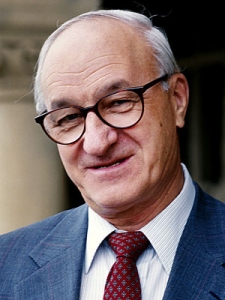


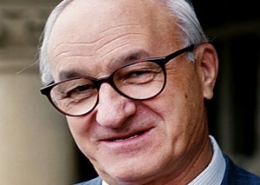
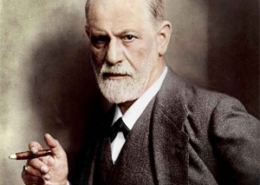
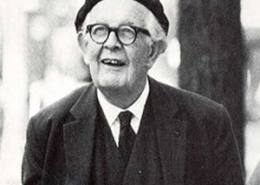
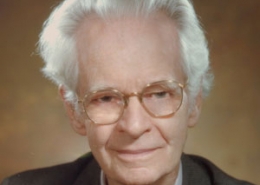


دیدگاه خود را ثبت کنید
تمایل دارید در گفتگوها شرکت کنید؟در گفتگو ها شرکت کنید.